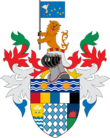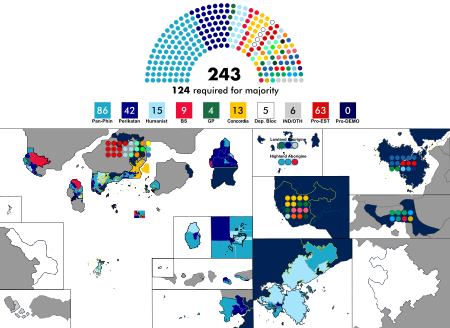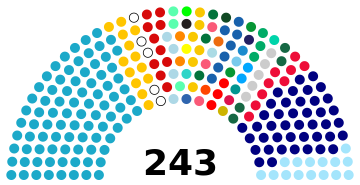Phinbellan general election, 1728

|
This article or section is a work in progress. The information below may be incomplete, outdated, or subject to change. |
| |||||||||||||||||||||||||||||||||||||||||||||||||||||||||||||||||||||||||||||||||||||||||||||||||||||||||||||||||||||||||||||||||||||||||||||||||||||||||||||||||||||||||||
| |||||||||||||||||||||||||||||||||||||||||||||||||||||||||||||||||||||||||||||||||||||||||||||||||||||||||||||||||||||||||||||||||||||||||||||||||||||||||||||||||||||||||||
| |||||||||||||||||||||||||||||||||||||||||||||||||||||||||||||||||||||||||||||||||||||||||||||||||||||||||||||||||||||||||||||||||||||||||||||||||||||||||||||||||||||||||||
 |
|---|
|
|
|
|
The 1728 AN Phinbellan general election (Phineaner: Pilihanraya Umum Repablik Persekutuan Phinbella 1728) was the first general election after the dissolution of the Phinbella Federal Legislative Assembly since October 1, RP 2619, and the first since the participation of Phinbella together with Forajasaki and Plazas de Irian as a realm in the Order of the Holy Lakes on 1.I.1728 AN. This general election was held on 13-24.XIV.1728 AN where all 241 of 243 House of Majilis seats consisting of 172 federal constituencies, 63 special administrative territory representatives and six aboriginal representatives will be at stake (representatives for seats for the Ross Dependency and Unincorporated Territory are elected not from among politicians but from among the PhAF military personnel who form part of the Territorial Reserve Force of Hurmu Fyrð). The last Phinbella Federal Legislative Assembly was dissolved on October 1, RP 2619 by the Chairman of the Council of Ministers immediately after the new Phinbellan constitution came into force (there was a sudden amendment after becoming a realm), and Mohammad Noh Rafail Irwan was appointed by the President of Phinbella as the Chairman of the Interim Government in almost four months (equivalent to almost four Norton years) until an official general election is held.
The new constitution that came into effect on October 1 provides for the establishment of a bicameral Parliament of Phinbella to replace the unicameral PFLA, which consists of the House of Senate (upper house) and the House of Majilis (lower house).
Lately, general elections are not only held at the federal level, they are also held simultaneously in the directly administered territory level and at the dependent territory level, in the new constitution it provides that territorial legislative assembly level elections and special administrative territories elections are allowed to be held separately independent from the federal parliament. However, all the territories of the federated states in Phinbella hold general elections simultaneously with the federal parliament. Most interestingly, the parliamentary representatives from the special administrative territories are also directly elected by the people, where the four special administrative territories have been allocated a total of 63 seats in the Parliament of Phinbella: 8 seats for Tanah Baharu, 15 seats for the Tri-State Area, 16 seats for Kota Hilir and 24 seats for Oriental Hispanioéire Taemhwan. The four special administrative territories control 27% of the 237 parliamentary seats.
Background
Significant events
There were no other significant events during the era of the previous government before RP 2619, or before the dissolution of that government in Phinbella, the most significant event being the promulgation of a new constitution of the Federal Republic of Phinbella to replace the then existing constitution. The declaration of the new constitution took place on September 20. The current constitution is very different from the previous constitution which consists of 25 chapters and 218 articles, besides that it takes a little from the previous constitution. In the new constitution provides for matters related to special administrative territories, and also changes the legislature system from unicameral to bicameral which causes the dissolution of the Phinbella Federal Legislative Assembly which consists of 132 to 183 seats and is replaced by the bicameral Parliament of Phinbella. The proposed delimitation of the federal and territorial constituencies was proposed and discussed after the new constitutional proposal was approved. The constitution officially came into effect on October 1 and since then the PFLA was officially dissolved, and the then Chairman of the Council of Ministers voluntarily resigned.
Another significant event on past-Constitutional reform, which took place on October 1 last saw that Oriental Hispanioéire Taemhwan was officially declared as a new special administrative territory after Kota Hilir, Tri-State Area and Tanah Baharu (which was just established in March RP 2619), all agreements between the federal government and the Taemhwanian government achieved through 14 Points in the Phinbellan-Taemhwanian Joint Offer Relating of the Special Status on the Taemhwanian Territory. During this year RP 2619 saw the establishment of new six territories of the federated states, Turku and Hōri, and Drusselstein on June 1, Kantō-shū Islands on August 15, Manschūhōria on September 1, Tanintʃhourim and Koitchh State on October 1. The Kantō-shū Islands had previously been a special administrative territory last February, but due to administrative constraints on this territory, the territory was downgraded to a territory of a federal state. Cyberaya was declared a directly administered territory last August, and Plazas de Irian was declared independent from Phinbella as the third constituent country of the Phineonesian Confederation, and subsequently became one of the three new realms in the Order of the Holy Lakes. This new constitution also saw significant changes in matters related to special administrative territories, especially in matters of administration, defense and foreign affairs as enshrined in the principle of "one country, two systems" in the federation, and so far there are four special administrative territory that has existed in Phinbella.
The end of RP 2619 saw the participation of Phinbella together with Forajasaki and Plazas de Irian into the Order of the Holy Lakes through the Phineonesian Accession Treaty signed by the Chairman of the Interim Government at The Istana, Negara Awan last December 20, where the treaty came into force on 1.I.1728 AN, and since then, many changes have taken place including the calendar system, defense, economy and currency.
Electoral system

Elections in Phinbella are conducted at the federal and territorial levels. Elections at the federal level currently elect members of the House of Majilis, the brand new lower house of Parliament, previously elections at the federal level elected members of the Phinbella Federal Legislative Assembly. While the territory-level elections in each of the 14 territories of the federated states as well as the eight directly-administered territories (three of the eight territories are in one administrative unit of the Phinbellan Maritime Territories) elect members of their respective territorial assemblies. Phinbella in the federal level follows a government system that is mostly from Britannic Empire, compared to the government system in Hurmu and other realms (except Forajasaki), the head of government (Chairman of the Council of Ministers at the federal level and the Chief Minister, or called Menteri Besar, at the territorial level) is the person who has the confidence of the majority of members in the respective legislature - this is usually the leader of the party or coalition with the majority of seats in the legislature.
The House of Majilis consists of 243 members, known as Members of Parliament (MP), who are elected for terms ranging from one year two months to two years equivalent to fourteen Norton years to twenty four Norton years. Out of the 243 members only 172 members were elected from single-member constituencies using the first-past-the-post voting system. While 63 members are representatives from special administrative territories where they will be elected by the people of the four territories using the party-list proportional representation voting system. Meanwhile, representatives of the Phinbellan aboriginal community (three from lowland aborigines and three from highland aboriginals) are elected using a single non-transferable vote system. Representatives from the Ross Dependency and Unincorporated Territory are only directly elected from among the military and not from politicians. However, even if one party or coalition gets a majority of seats, the federal government can only be formed through the support and coalition of parties or coalitions from regional blocs, dependent territorial blocs and special administrative territorial blocs, the federal government can still be formed through coalitions or confidence and supply agreements. with other parties and blocs. In electoral practice, coalitions and alliances in Phinbella are generally continuous between elections, and member parties usually do not contest for the same seat, they are even transferred to other seats, sometimes some are still contesting in the same seat.
In the constitution, unlike the previous one, it has been provided that the voting age should be 16 years and above (16 Norton years old and above are considered as eligible to vote), and voter registration has been made automatically.
Timeline
Dissolution of PFLA
As a result of the implementation of the new constitution, the Phinbella Federal Legislative Assembly was officially dissolved on October 1, RP 2619 by the Chairman of the Council of Ministers at the time after approval by the President of Phinbella, Muhammad Furkorn Mat Jeen, two days after a meeting between them, where His Excellency gave his approval for the dissolution on the date of the implementation day of the new constitution. This election is given to be held within three to four months, and after that the next federal election will be held within sixty days according to the current constitution. This announcement was made during a special address on television and radio throughout Phinbella by the then Chairman of the Council of Ministers. Mohammad Noh Rafail Irwan was appointed by the President of Phinbella as the Chairman of the Interim Government in almost four months.
Pre-nomination events
On 18.I.1728 AN, the Phinbellan Election Commission (SPR) updated the list of approximately 40 parties and coalitions eligible to contest in their own right. Independent candidates are allowed to contest using symbols that have been set by the SPR.
Timetable
| Dates | Events | |
|---|---|---|
| September 20, RP 2619 | 19.X.1724 AN | New constitution presented |
| September 21-22 | XI.1724 AN | The discussion session in PFLA |
| October 1 | 1.I.1725 AN | New constitution ratified and enforced |
| 5.I.1725 AN | Dissolution of PFLA | |
| October 2 | 17.I.1725 AN | Mohammad Noh Rafail Irwan was appointed by the President of Phinbella as the Chairman of the Interim Government. |
| December 10 | 18.V.1727 AN | Election Commission announcement of Election Day and its timeline |
| 22.V.1727 AN | Issue of the Writ of Election | |
| 5.VII.1728 AN | Nomination day | |
| 5.VII - 12.XV.1728 AN | Campaigning period | |
| 13.XII - 12.XV.1728 AN | Early polling day for postal and advance voters | |
| 13-24.XV.1728 AN | Polling day | |
Last election pendulum
Political parties and candidates
Due to the implementation of the new constitution and the conversion to a bicameral Parliament of Phinbella, the Election saw many constituency boundary changes resulting in the addition of seats, likely candidates either being declared out of their home constituencies to contest in other constituencies, or some high-profile MPs tall is dropped from selection. A total of 28 former PFLA members contested under an independent ticket or an opposing party's ticket to defend their seats or contest again. Every party contesting the post-Constitution implementation general election featured some new faces in the candidacy.
Campaign
Party and coalition manifestos
Opinion polls
Results
By alliance
By parliamentary seats
Seats that changed allegiance
Aftermath
Formation of federal government
On 6.XV.1728 AN, the Pan-Phineonesian-PETIR Coalition was announced to win the first election since becoming the realm of the Order of the Holy Lakes according to the number of seats of the federal geographic constituency and mixed with the aboriginal representative constituency, but it almost reached half of the 178 seats. In all the contested parliamentary seats, there was no individual coalition or alliance to form a single government that won the 122 seats required for a majority in the House of Majilis to form a new federal government.
The Phinbellan Alliance, the Humanist Front, the Socialist Front and Gerakan Perpaduan discussed and negotiated in the afternoon that is on the 8.XV, it consulted together on pro-Establishment leaders from the four special administrative regions to join the four alliances to form a new government, however, these negotiations could not reach a consensus, because the Socialist Front did not want to join the new alliance for the reason that they did not want their ideology to spread to other alliances after becoming a government. The pro-Establishment coalitions disagreed with the formation of the new government that the four coalitions participated in, and decided to join with other alliances.
On 11.XV.1728 AN, the leader of the Pan-Phineonesian-PETIR Coalition and the leader of the Dependencies bloc and the Manschūhōrian bloc met at the Jembara Langkupik Hotel in Pos Appat, and it ended negotiations at 04:00 am (NAT) on 15.XV.1728 AN. The Dependencies bloc and the Manschūhōrian bloc agreed to join the Pan-Phineonesian-PETIR coalition. Also on 15.XV.1728 AN after finishing negotiations, the deadline for political parties to prove their majority in Parliament to form a government and nominate the chairman of the Council of Ministers was extended for 24 to 28 Norton days by the President of Phinbella, moving the deadline to the day after. The extension gives way to the media in Phinbella to cover directly other than post-election issues for 24 Norton days.
On 6.I.1729 AN, Fakhrul Asam Pariaman, secretary-general of the Humanist Front stated that the Humanist Front would not support either the Pan-Phineonesian-PETIR or the Phinbellan Alliance to form a government and was prepared to sit in opposition. However, the Phinbellan Alliance also stated the same thing when it did not get support from other coalitions, then this coalition was ready to sit as the opposition. On 9.I.1729 AN, exactly at 16:08 NAT, these four coalitions agreed that they are ready to be the opposition to check and balance the new government that will be formed. The Progressive Party of the Orange Free State and three independent members are said to be ready to join the opposition bloc.
On 10.I.1729 AN at 18:25 NAT, the leaders of the pro-Establishment coalition in the Special Administrative Regions bloc decided to join together with the Pan-Phineonesian-PETIR Coalition joined by the Dependencies bloc and the Manschūhōrian bloc. This decision was made during a negotiation session between the leaders of the Special Administrative Regions for the benefit of these regions.
On 12.I.1729 AN, the Chairman of the Pan-Phineonesian-PETIR, Yvar Onigawa Worthyngton has received the support of parliamentarians from the coalition itself, the Dependencies bloc, the Manschūhōrian bloc and even the Special Administrative Regions bloc from the pro-Establishment. And after discussing and consulting in a meeting with members of the Presidential Council, The Istana announced that Yvar Onigawa Worthyngton was appointed as Chairman of the Council of Ministers by the President of Phinbella, Muhammad Furkorn Mat Jeen. At 09:30 NAT, 17.I.1729 AN, Yvar Onigawa Worthyngton was sworn in, making him the new Chairman of the Council of Ministers after the first election after Phinbella became a realm of the Order of the Holy Lakes.
Order of the Holy Lakes reactions
International reactions
See also
| ||||||||||||||||||||||||||||||||||||||||||||

